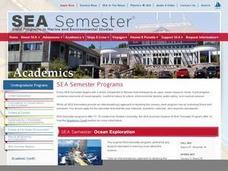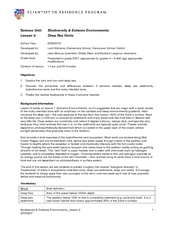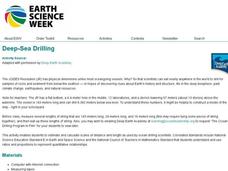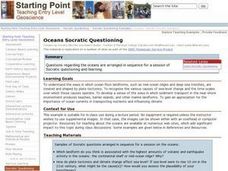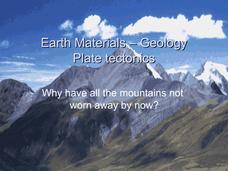Curated OER
Sampling the Ocean Floor
Students sample goodies from an unseen ocean floor and try to accurately describe their composition. This simulation helps students explain the limitations of sampling and the problem of obtaining representative samples of sea floor...
Curated OER
Deep Sea Vents
Learners study the vent and non vent deep sea and see the differences in habitats. In this investigative lesson students complete a worksheet and work in groups.
NOAA
Sediments
Calcareous ooze ... what an interesting name! The 15th installment of a 23-part NOAA Enrichment in Marine sciences and Oceanography (NEMO) program focuses on sediments found on the ocean floor. After viewing the slideshow lecture,...
Curated OER
Oceanography Worksheet #1
If you are teaching physical oceanography to middle school earth scientists, here is a terrific multiple choice worksheet. Learners look at a diagram of a landscape created by glacial sediment deposition and the resulting ocean floor....
Curated OER
Coasts and Reefs: Shallow Marine Processes
A more thorough presentation on coastal systems would be difficult to find! Detailed diagrams illuminate the offshore, shoreface, foreshore, and backshore zones of beach. The sources and movement of sediments along the coastline are...
Curated OER
The Ocean Floor
Fifth graders discuss the process of sedimentation and the continental drift theory. They locate major structures on the ocean floor and they identify life forms at each level of the ocean.
Curated OER
Deep Sea Drilling
Students explore ocean vessels that drill the ocean floor. In this ocean drilling lesson, students watch videos about drilling the ocean floor and discuss. Students get into groups, go outside and use string to mark off the amount of...
Curated OER
Oceans Socratic Questioning
Students participate in a whole class discussion of ocean-floor structures and plate tectonics. They respond to prompts in a structured sequence that lead them to conclusions about the role of plate tectonics in the creation of sea-floor...
Curated OER
Earth Materials - Geology and Plate Tectonics
Not going into depth on any one topic, this Earth science presentation skims the crust. It touches on the materials that construct the crust and then moves into plate tectonics. This is a useful and colorful note-taking guide for your...
NOAA
Ocean Geologic Features
Sediment samples from the ocean bottoms tell scientists about climate change, pollution, and changes in erosion for the area. Groups of learners focus on sediments and their movement through water. During a hands-on activity, they...
Curated OER
Sedimentation
Students are introduced to the various types of sedimentation. In groups, they define the term and research what causes it to happen. They compare and contrast the different types of sedimentation and research how it occurs off of Cape...
Consortium for Ocean Leadership
Nannofossils Reveal Seafloor Spreading Truth
Spread the word about seafloor spreading! Junior geologists prove Albert Wegener right in an activity that combines data analysis and deep ocean exploration. Learners analyze and graph fossil sample data taken from sites along the...
Curated OER
Ocean Floor Properties and Near Shore Environments
Students explore and model the characteristics of the ocean floor and near shore environments through in-class demonstrations, laboratory activities, and internet research. They use classroom materials to research the characteristics of...
Curated OER
Diatom Ooze
Students explore seafloor sediment. In this ocean environment lesson, students describe the characteristics of different types of seafloor sediment and oozes. They compare and discuss locations of sediments and oozes by plotting the...
Curated OER
Monsters of the Deep
Students describe major features of cold seep communities and list the organisms that are typical in these communities. For this deep sea environment lesson students work in groups and research their given cold seep group.
Curated OER
The Seafloor
In this seafloor worksheet, students review the terms associated with formations found on the seafloor including sea mounts and seafloor spreading. This worksheet has 8 fill in the blank questions.
Curated OER
Sea Secrets
Students study the following: For centuries, people have been challenged by the mysteries that lie beneath the blue depths of our ocean planet. Very little was known about the ocean until late in the nineteenth century, although nearly...
NOAA
Ocean Zones
How can organisms light up in water? Bioluminescence is light produced in a chemical reaction that can occur in an organism's body. First, learners determine what happens to light/color as you move into the deep ocean. In groups, they...
Curated OER
Entering the Twilight Zone
Students describe major features of cold-seep communities and the process of chemosynthesis as it relates to organisms in each habitat. In this deep-sea habitats lesson plan, students study the categorization of ocean habitats according...
Curated OER
This Old Tubeworm
Students plot data to construct and interpret a graph about vestimentiferans at cold-seep sites in the Gulf of Mexico. In this deep sea lesson, students plot data provided for the growth of tubeworms. They use the graphs to determine...
Curated OER
Ride the Rock Cycle
Students identify the steps in the rock cycle. They complete a K-W-L chart before the lesson begins. They answer questions about the stages to complete the lesson.
Mr. E. Science
Plate Tectonics
Get a detailed look at plate tectonics with a 14-slide presentation that highlights the Earth's layers, continental drift, seafloor spreading, the theory of plate tectonics, and boundary types. Each slide provides thorough explanations,...
Curated OER
A Bit of Engineering
Students discuss the drilling process. In this engineering lesson, students get into small groups and drill their own core samples in a sandwich using a plastic tubing, a jumbo straw, a slim straw and a offee stirrer predicting which...
Curated OER
Cruising the Mantle
Young scholars explore the plate boundaries of the earth. Through the use of video, internet and hands-on activities, students examine the types of plate boundaries. They create a model to illustrate the movement and interaction of the...


